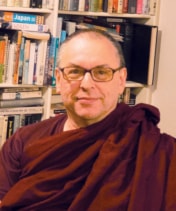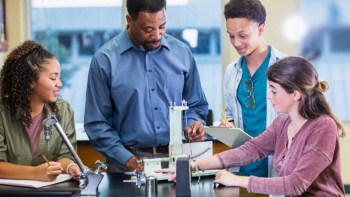David Levey is a recently ordained Buddhist monk at the Oxford Buddha Vihara, Oxford, UK. He has degrees in philosophy and physics
 What sparked your initial interest in physics?
What sparked your initial interest in physics?
I remember being gobsmacked when I saw the interference pattern of waves in a ripple tank in my first year at secondary school. A description of this phenomenon was given to me in mathematical language, capturing the seemingly uncapturable. Quantum mechanics (specifically the Heisenberg uncertainty principle) provided further astonishment. After some unenjoyable years in chartered accountancy, I could no longer resist the lure of the quantum world and took myself off to read physics at University College London, immediately followed by a PhD in quantum field theory at Imperial College London.
Did you ever consider a career in academia?
I took up a couple of postdocs after my PhD. At that time, I remember my interest turned briefly towards nonlinear dynamics and chaos, but I have always been enthralled by the quantum world. However, quite early on I found that academic life can dim the wonderment and cloud the original vision. I suppose that if I had decided to keep going in academia, I would have pursued quantum field theory in some way. But other forces were at work, leading me in a different direction.
How did you get interested in mathematics and teaching?
Delight in mathematics has been my constant companion. I found myself wanting to communicate my love for it to younger minds. My experience as a teacher was rewarding, both for me and for my students. I also had fun with extracurricular mathematics activities: at Loretto School in Scotland, I helped run a Riemann Society for sixth-formers, and at Cheltenham Ladies’ College, I started the Euler Society. This was great as we could play around with all sorts of things that would never be on the school curriculum – introductions to group theory and topology, gems from number theory, non-Euclidean geometry and more. We also took part in UK Mathematics Trust challenges, where I remember we had some measure of success – one year, we came first in the senior regional finals, despite some hefty competition.
What were the challenges of moving from academia to teaching at secondary school?
I suppose the main challenge was how to create an effective communication channel between my experience and my students’. This seemed to emerge quite spontaneously and effectively when not forced. I listened to my students and, on the whole, they listened to me. I tried to address all concerns on an equal footing. For the naturally gifted student, the challenge was to meet their enthusiasm and acuity with encouragement and appreciation. I came across perhaps two or three exceptionally able mathematicians, which was a privilege. I remember presenting a proof of the irrationality of pi involving many steps, and some quite challenging mathematics. The most able students not only followed the intricate reasoning but kept me on the right path when I lost the thread. I suppose the other major challenge was to adjust to working as a member of a team rather than a solo operator. I’m still working on that one.
How did you become interested in Buddhism?
I won’t go into all my own personal details, other than to say I was born into a Jewish family, and answers were not forthcoming from my native religion and milieu. As a teenager, I read widely and furiously. I probed into every philosophy and religion. I could connect with much of what many had to say, and I noted the commonalities. I quickly cottoned on to any discrepancies between doxis and praxis – not all who talked the talk walked the walk. The story of the Buddha’s life and enlightenment struck home in my teens. But it wasn’t until about 20 years later, when I finally decided to learn meditation from a Burmese monk in a north London Buddhist temple that, as they say, I saw the light.
How has your background in physics helped or influenced your work as a teacher?
I’d have to say to a very limited degree. My physics research was mainly about finding things out for myself. On the few occasions I did any teaching during my research, it was like delivering a report or an update. There was not much sense of a dialogue. Of course, I now realize that this is precisely how many lecturers approach their teaching commitments. But teaching in high school is an altogether more personal affair. The dynamic is much richer and there is a lot more going on than the mere passing on of knowledge. A background in physics engenders a methodical approach in whatever activity is subsequently undertaken, and no less so in teaching.
Any advice for today’s students?
Can you still feel in your research or studies the visceral contact with the physical world? Can you let yourself be amazed by what you are dealing with? At this point I could sneak in a plug for mindfulness, given that I am ordained, and I suppose not too many Buddhist monks appear in the Physics World careers section. Truly, a connection between physics research and mindfulness is hard to resist. You must summon all your qualities of perseverance, sincerity and patience. Science and Buddhism both deal with the world we live in. Both rely on honest investigation. For the “big questions” of physics and of life, it’s only natural to be uncertain and in doubt. Be honest investigators.
- Enjoy the rest of the August 2018 issue of Physics World in our digital magazine or via the Physics World app for any iOS or Android smartphone or tablet. Membership of the Institute of Physics required


